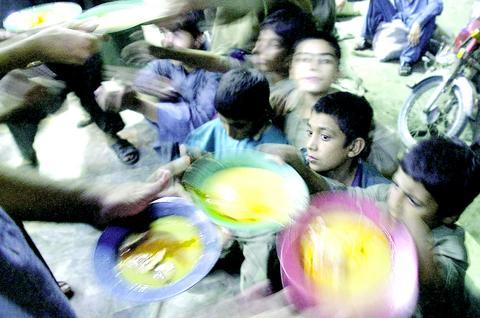Sitting outside a government-administered zakat (charity) office, Parveen Naz waits her turn to cajole a desk worker for the paltry grant to feed her four children and ailing husband.
Naz, 32, a telephone operator who suffers tuberculosis and looks a decade a older due to malnutrition, has been struggling to keep herself and her family alive since she and her spouse were laid off more than two years ago.

PHOTO: AFP
"I would have committed suicide, because at times it becomes intolerable to see my children's famished faces," Naz said, despairing of getting much help from the corruption-riddled zakat office. "But it's their existence which prevents me from doing so."

PHOTO: AFP
Her husband began sniffing heroin after protracted unemployment, and has left all family responsibility to Naz.
"I have lost two sons because I couldn't get medical treatment for them. I do not want to lose the surviving children, but all I can see is darkness ahead," she said.
Naz' family is not alone in its misery.
Some 50 million Pakistanis or 33 percent of the population are living in poverty, according to the State Bank of Pakistan's annual report released last week.
Poverty has risen 13 percent over the past 15 years, the report found, despite the economy's skyrocketing performance on paper in the past three years.
Expecting any significant short-term drop in poverty was "simply a pipedream," according to a sober warning by the central bank.
The Pakistani economy has performed robustly since 2000 with most major economic indicators beating all-time records.
Foreign exchange reserves have soared from a mere US$1.97 billion in 2000 to above US$11 billion last September; exports grew 22 percent to US$11 billion for the year ended June and GDP grew by 5.1 percent, compared to 3.6 percent previous year.
But appears to be strong economic growth has had little impact on the lives of tens of millions of Pakistanis.
"Despite the impressive improvement in macroeconomic fundamentals, the popular perception about the economy amongst media and commentators does not reflect the improvement," the central bank stated in its annual report last week.
The bank blamed poor economic policies of the previous regimes of now-exiled Prime Ministers Benazir Bhutto and Nawaz Sharif since 1987.
But independent economists pointed the finger at the current administration of President Pervez Musharraf.
"The government has compiled data for the Pakistan household integrated survey but is reluctant to make it public because I am sure that reveals a further increase in poverty," Qaiser Bengali, chief of the Social Policy and Development Centre (SPDC) said.
The survey is one of the main mechanisms for evaluating the impact of social developments in Pakistan.
He said boosting public spending was the only answer.
"The debate is not whether [poverty] is 33 percent or 36 percent but the focus must be on how to eradicate it meaningfully. Only a well-directed and high public development expending could arrest the trend."
Islamabad awarded a record 30 percent boost to development spending in the annual budget in June to 160 billion rupees (US$2.8 billion) or 3.6 percent of GDP.
Economists shrug off the increase as inadequate.
"Any level of public development expenditure below 7 percent of GDP could hardly make a dent in poverty levels or propel sustainable economic growth," economist Shahid Hasan Siddiqui said.
The only way to reverse poverty growth would be economic growth of 6.0 to 7.0 percent for the next five to six years, economists and the bank agree.
"There is no magic wand to eliminate poverty, unless we catch up with sustainable growth rate of 6 percent," central bank governor Ishrat Husain said.

AIR SUPPORT: The Ministry of National Defense thanked the US for the delivery, adding that it was an indicator of the White House’s commitment to the Taiwan Relations Act Deputy Minister of National Defense Po Horng-huei (柏鴻輝) and Representative to the US Alexander Yui on Friday attended a delivery ceremony for the first of Taiwan’s long-awaited 66 F-16C/D Block 70 jets at a Lockheed Martin Corp factory in Greenville, South Carolina. “We are so proud to be the global home of the F-16 and to support Taiwan’s air defense capabilities,” US Representative William Timmons wrote on X, alongside a photograph of Taiwanese and US officials at the event. The F-16C/D Block 70 jets Taiwan ordered have the same capabilities as aircraft that had been upgraded to F-16Vs. The batch of Lockheed Martin

US President Donald Trump yesterday announced sweeping "reciprocal tariffs" on US trading partners, including a 32 percent tax on goods from Taiwan that is set to take effect on Wednesday. At a Rose Garden event, Trump declared a 10 percent baseline tax on imports from all countries, with the White House saying it would take effect on Saturday. Countries with larger trade surpluses with the US would face higher duties beginning on Wednesday, including Taiwan (32 percent), China (34 percent), Japan (24 percent), South Korea (25 percent), Vietnam (46 percent) and Thailand (36 percent). Canada and Mexico, the two largest US trading

GRIDLOCK: The National Fire Agency’s Special Search and Rescue team is on standby to travel to the countries to help out with the rescue effort A powerful earthquake rocked Myanmar and neighboring Thailand yesterday, killing at least three people in Bangkok and burying dozens when a high-rise building under construction collapsed. Footage shared on social media from Myanmar’s second-largest city showed widespread destruction, raising fears that many were trapped under the rubble or killed. The magnitude 7.7 earthquake, with an epicenter near Mandalay in Myanmar, struck at midday and was followed by a strong magnitude 6.4 aftershock. The extent of death, injury and destruction — especially in Myanmar, which is embroiled in a civil war and where information is tightly controlled at the best of times —

China's military today said it began joint army, navy and rocket force exercises around Taiwan to "serve as a stern warning and powerful deterrent against Taiwanese independence," calling President William Lai (賴清德) a "parasite." The exercises come after Lai called Beijing a "foreign hostile force" last month. More than 10 Chinese military ships approached close to Taiwan's 24 nautical mile (44.4km) contiguous zone this morning and Taiwan sent its own warships to respond, two senior Taiwanese officials said. Taiwan has not yet detected any live fire by the Chinese military so far, one of the officials said. The drills took place after US Secretary